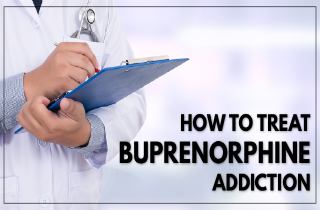Not everyone who takes buprenorphine will become a buprenorphine addict. But if you find yourself craving buprenorphine, taking it longer or in higher doses than intended, or continuing use despite negative consequences…you may have a problem. Here, we address how can you address buprenorphine addiction and the recommended medical channels that treat addiction. Then, your questions about symptoms or buprenorphine withdrawal or addiction to buprenorphine are invited at the end.
Buprenorphine addiction treatment: Are you even addicted?
Buprenorphine is a semi-synthetic opioid used to control chronic pain and moderate acute pain in non-opioid-tolerant individuals, or as an opiate substitution therapy. While buprenorphine can help many people, it can also be habit forming and addictive.It is available in a variety of name brand formulations: Subutex, Suboxone, Zubsolv, Temgesic, Buprenex, Norspan and Butrans. Patients taking buprenorphine for therapy say that it is almost impossible to experience euphoria after the first few doses, which leads to doubling the dosage. Still, buprenorphine can be used recreationally by opioid users.
The most common routes of administration include insufflation and intravenous administration of dissolved buprenorphine pills. The tablets are crushed and snorted, causing euphoric rush, just like other opioids. Mixing buprenorphine and alcohol is less likely, but is still considered drug abuse. Still, bruises on the veins, runny nose and watery eyes would be the first physical symptoms to look for when being next to buprenorphine addict. Recreational users also report withdrawal symptoms upon cessation or significant decreases in dosage, as with any other drug physical dependence.
Here is a list of signs of physical and psychological symptoms, which can point to addiction to buprenorphine.
- compulsion to use buprenorphine
- continued use despite negative life consequences
- craving
- diarrhea
- distress/irritability
- insomnia
- lacrimation (secretion of tears)
- loss of control of use
- mild fever
- muscle aches/cramps
- nausea or vomiting
- piloerection and problems ejaculating
- pupillary dilation
- rhinorrhea (runny nose)
- sweating
- yawning
Treating buprenorphine addiction
There are several recommended approaches for buprenorphine addiction treatment. However, the first approach on the list includes behavioral and psychotherapy. These types of treatments use tools that address the root cause of drug addiction, helping addicts understand the consequences of the drug use, become aware of the damage, regain social skills and replace the old habits with positive new ones. Contingency management, 12 step facilitation, group therapy, and individual counseling are all examples of this types of treatment, relying on the theory that repetition of positive behaviors leads to positive outcomes.
On the other hand, pharmacological treatment for buprenorphine addiction can be very complex and requires strict medical supervision. There are medications which can address and treat symptoms of withdrawal as they occur. Likewise, some medications can address cravings for buprenorphine, as well as mood disorders. For example, buprenorphine tolerance and dependence can be addressed with naloxone. However, concurrent use of these drugs with central nervous system (CNS) depressants (such as benzodiazepines) is not recommended, in order to avoid the risk of fatal respiratory depression.
Treatment for buprenorphine addiction
In order to properly address buprenorphine addiction, you need know which medical professionals are capable to offer you treatment. There are basic steps that you need to follow in order to plan the approach towards the addict and successfully attend the treatment. Here are a couple of examples of recommended treatments and health care providers you can seek out.
Detox clinics – Detox clinics offer medical super vision during buprenorphine withdrawal. These clinics offer medical support and use both prescribed and over-the-counter medications to address symptoms of withdrawal as they occur. However, take notice that a pharmacological approach should be used only when recommended by a doctor.
Intervention – An intervention is planned activity manifested by the family and friends of a buprenorphine addict in order to raise awareness about social and health concerns caused by the drug abuse. A successful intervention requires thorough research about suitable treatment options, both medically and financially, and facilitation of a private meeting directly with the addict.
Mental health professionals – You can consult with a psychologists or psychiatrist to treat addiction in an outpatient setting. Most experts recommend at least a year of counseling after initial withdrawal in order to achieve long term sobriety.
Outpatient addiction treatment – Outpatient buprenorphine addiction treatment is the best option for addict who is able to maintain abstinence in their current home and working environments. Outpatient treatment is best for highly motivated individuals who are able to drive to multiple appointments and meetings each week. Outpatient program intensity may vary, depending on the type of support that the patient has outside of the facility.
Residential addiction treatment – Residential buprenorphine addiction treatment is probably the most intense of all treatments, as you can rely on the medical staff, advisors, and addiction counselors to provide round the clock care. Support comes in many forms, such as psychological, physiological, social, etc. Help is present 24/7 and supervision guides intended treatment course. Starting from 3 to 6 weeks, a residential facility can become a second home for the addict.
How to treat buprenorphine addiction questions
If there is more that you would like to know about treating buprenorphine addiction, please feel free to post your questions or share comments in the following section. Our team will make sure that you receive an accurate personal and prompt answer.









Related Posts